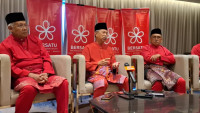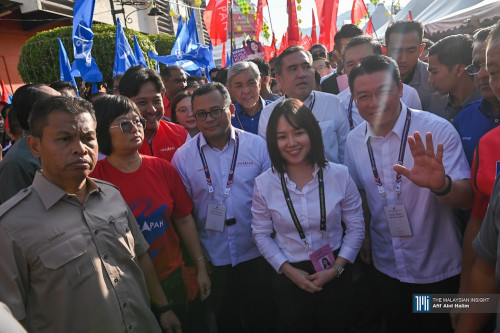JOHOR BARU – The by-elections in Johor’s Simpang Jeram and Pulai have concluded, and while Pakatan Harapan (PH) appeared to have secured a robust victory at first glance, the underlying dynamics tell a far more complex tale.
These results provide us with an opportunity to gauge the shifting political currents of Malaysia, revealing much about voter sentiment and the various nature of electoral politics.
The Pulai and Simpang Jeram results challenge simplistic interpretations.
While PH can take solace in its victories, it cannot afford to be complacent.
The surge in votes for Perikatan Nasional (PN) – marked by more than a 60% increase in Simpang Jeram and 43% rise in Pulai compared to previous elections – suggests a base that is revolving.
This gain occurred despite a notably reduced voter turnout, hinting at a consolidation of support around PN.
Despite a drop in voter turnout from 71% in the 15th general election to just 47.33% in Pulai, PN garnered nearly 9,000 more votes.
This migration is exemplified by the following breakdown.
This significant shift is believed to be from Barisan Nasional (BN) to PN and it shows a broader realignment in voter loyalties.
While the Pulai federal constituency witnessed a huge drop in turnout, the Simpang Jeram state constituency recorded an increase in voter participation, rising from 54.72% in the 2022 Johor state election to 60.85%.
However, here the voter migration from BN to PH is estimated at around 60% while to PN it’s about 40%.
However, when analysing the considerable increase in actual votes for PN and comparing it against PH’s victories, it uncovers a more profound narrative – one of voter realignment and shifting allegiances.
It is likely that Malay voters who once threw their weight behind BN or Umno, are now reconsidering their loyalties, gravitating towards PN.
These numbers underscore the substantial movement of BN voters towards PN, signalling a potential paradigm shift in Malaysian and Johor politics.
Those who abstained from voting
It is noteworthy that this voter realignment and the surge in PN’s support occurred within a relatively short span of less than a year.
The question that now arises is: what will the political landscape look like in the next four years if Johor fails to anticipate this wave?
It is a challenge that Umno-BN leaders must grapple with as they ponder whether to embrace this shifting political reality.
While PH supporters may find solace in their victories, they should also not overlook the significant number of voters who did not vote in the polls.
This abstention implies a sense of disillusionment or detachment among a segment of the electorate. It serves as a reminder to the parties that merely anticipating different results without addressing core issues is an unwise strategy.
Deputy Prime Minister Datuk Seri Ahmad Zahid Hamidi’s discharge not amounting to an acquittal (DNAA) was expected to have far-reaching consequences in the polls.
Critics foresaw it as a potential deterrent for PH’s reformist base, while proponents believed it could reinvigorate Umno’s support base.
Anticipated to be a momentous game-changer, its actual impact seems more muted. It did not create a tidal shift in PH’s favour and raises questions about the effectiveness of such legal proceedings in swaying voter sentiments.
Although non-Malay voters are making a lot of noise over the DNAA, their vote is still in favour of PH-BN. This is mainly due to the aggressive Malay and religious-centric approach employed by PN.
The alternative of having a PAS-led government is something that scares them so much that very few are able to even think about voting for them.
Unsustainable reliance on divisive rhetoric
The Johor by-elections also spotlight PN’s performance. Despite attempting to consolidate the Malay vote and deploying targeted messaging, its modest gain of 9,000 votes falls short of expectations.
This limited traction underscores the need for PN to reassess its approach and connect more effectively with the middle ground of Malay and non-Malay voters.
The heavy reliance on divisive narratives may not be sustainable, and future campaigns may require a more inclusive stance.
The perceived “green wave” of PN did not manifest as vigorously as some proponents hoped.
While a victory was indeed achieved by PH, the numbers and PN's increased vote share reveal cracks that both sides need to pay attention to.
In examining the by-election data, it is evident that the once-clear demarcations of party loyalty are blurring. The statistics show intriguing patterns such as the transferability of votes from BN to PH in this by-election.
This interchangeability of support between parties points to a Malaysian electorate that's becoming increasingly pragmatic, discerning, and fluid in its choices, especially the Malay voters.
The Johor by-elections, in many ways, act as a mirror to the broader sentiments growing in the nation.
They hint at an underlying restlessness, a desire for genuine political evolution, and possibly an electorate tired of the same old narratives.
While both sides of the political divide have lessons to learn, there is an unequivocal message: the electorate wants more than just promises; it seeks tangible change and stability. – The Vibes, September 11, 2023


























_president_Muhammad_Azlan_Abas-Najjua_Vibes_pic.PNG)
